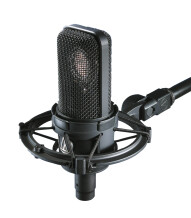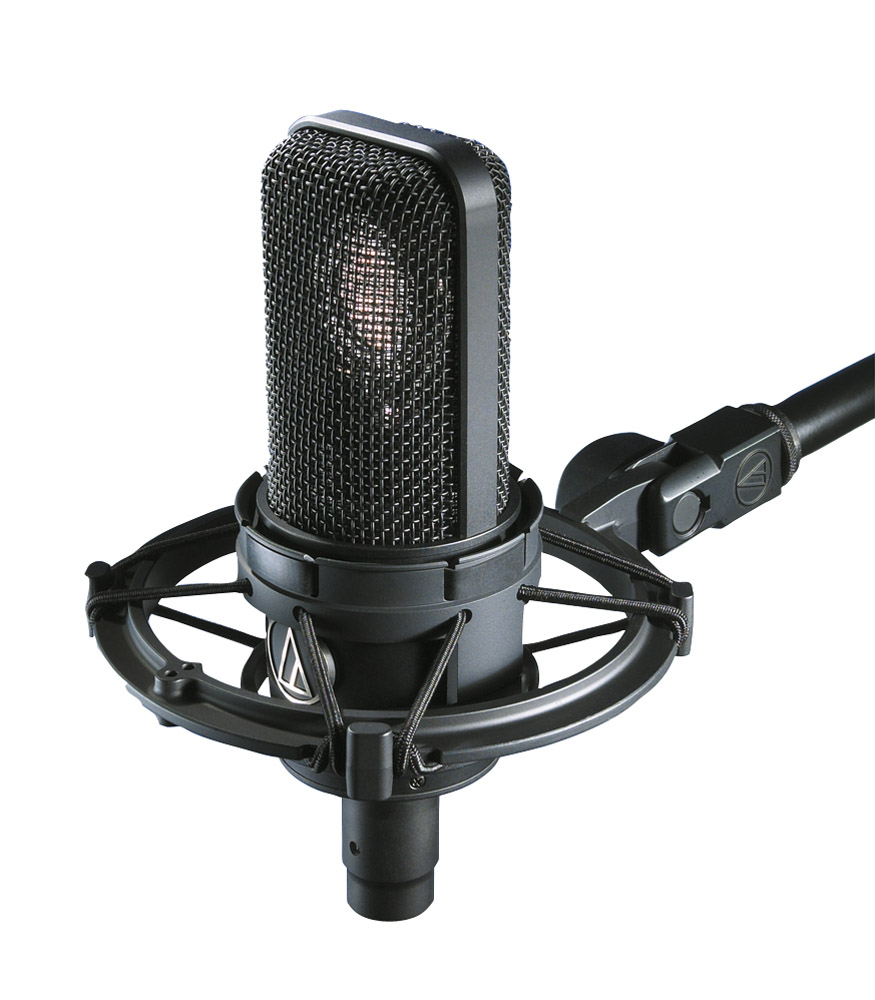Voir les autres avis sur ce produit :
« Great little vocal microphone! »
Publié le 06/07/11 à 10:35The Audio-Technica AT4040 is a side address fixed cardioid studio condenser microphone that is touted as very consistent and very natural by Audio-Technica. It boasts a rather impressively low noise figure at only 12 dB of self-noise, and an equally impressive accompanying signal to noise ratio of 82 dB. Aside from that, it includes the expected 10 dB pad and the low end roll-off starting at 80 Hz that one would expect to find on most microphones of this caliber.
The AT4040 has a rather standard frequency response of 20-20,000 Hz. One look at the frequency response curve, however, and it is obvious what the Audio-Technica was trying to do when they were engineering this little bugger: tailor it for vocals. It has a rather significant bump at 6-7 kHz, a dip in the sibilance range from 8-10 kHz, and a nice boost of air right above 10 kHz. While when using it on my voice, it was a dream, this, unfortunately, can wreak havoc on the sound if it happens to be put in front of the wrong singer.
Why? All of these critical frequencies in the voice--upper midrange, sibilance, air--they are all next door neighbors to each other. On some voices, 6-7 kHz is in the upper midrange, but on others' voices, it is smack dab right in the middle of their sibilance zones. It also works the same way on the other end; perhaps boosting at 11-13 kHz or so may work on some voices, but some people have sibilance zones that go into this range. Essentially speaking, while this microphone can for the most part avoid harshness compared to many of the Chinese microphones that just seem to boost everything over 6 kHz, be prepared to find some bizarre sounds coming out of some vocalists.
But who said one microphone can be used by everyone? Not me.
OVERALL OPINION
The Audio-Technica AT4040 is a great little beast that will sound better than any of the lower end Chinese microphones on the market, but that's not saying much. It works very well on me, but there are vocalists it just should not be on. However, even if you place it on these unsuited voices, the results will still be much better than the "boost everything" mentality that the Chinese K67-type microphones push. It's always an upgrade from your MXL microphone, but certainly not always against its peers.
The AT4040 has a rather standard frequency response of 20-20,000 Hz. One look at the frequency response curve, however, and it is obvious what the Audio-Technica was trying to do when they were engineering this little bugger: tailor it for vocals. It has a rather significant bump at 6-7 kHz, a dip in the sibilance range from 8-10 kHz, and a nice boost of air right above 10 kHz. While when using it on my voice, it was a dream, this, unfortunately, can wreak havoc on the sound if it happens to be put in front of the wrong singer.
Why? All of these critical frequencies in the voice--upper midrange, sibilance, air--they are all next door neighbors to each other. On some voices, 6-7 kHz is in the upper midrange, but on others' voices, it is smack dab right in the middle of their sibilance zones. It also works the same way on the other end; perhaps boosting at 11-13 kHz or so may work on some voices, but some people have sibilance zones that go into this range. Essentially speaking, while this microphone can for the most part avoid harshness compared to many of the Chinese microphones that just seem to boost everything over 6 kHz, be prepared to find some bizarre sounds coming out of some vocalists.
But who said one microphone can be used by everyone? Not me.
OVERALL OPINION
The Audio-Technica AT4040 is a great little beast that will sound better than any of the lower end Chinese microphones on the market, but that's not saying much. It works very well on me, but there are vocalists it just should not be on. However, even if you place it on these unsuited voices, the results will still be much better than the "boost everything" mentality that the Chinese K67-type microphones push. It's always an upgrade from your MXL microphone, but certainly not always against its peers.




